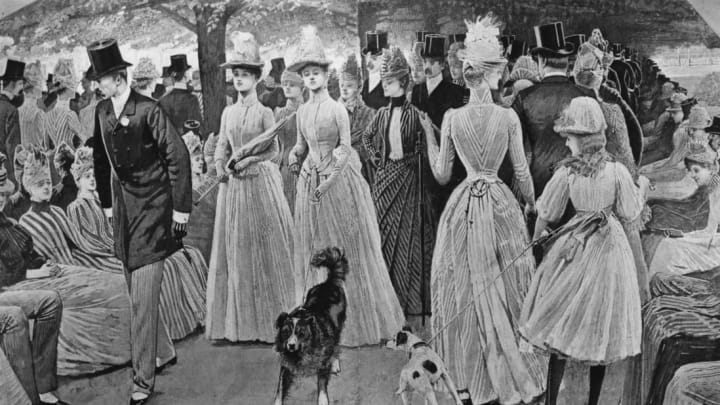14 Wonderful Old Words for Walking We Should Bring Back
By Mark Peters

Now that spring is here, no matter how committed you are to cars, it’s hard to resist an occasional mosey or stroll. Whether you prefer ambling through the park or zigzagging down a busy sidewalk, this is a lovely time to hoof it. Lucky for us all, the history of English has plenty of rare or forgotten words for walking that will put a glide in your stride.
1. AND 2. SNAFFLE AND SOODLE
These fanciful-sounding words have no definitive origin: They probably just sounded right to someone who was sauntering, which is what they both mean. An Oxford English Dictionary (OED) example from 1821 describes someone “soodling up and down the street.”
3. NOCTAMBULATE
If you sleepwalk—or just like to stroll about after dark—you have a tendency to noctambulate, or walk around at night.
4. SNUDGE
The first sense of snudging refers to being cheap, stingy, miserly, and Scrooge-like. Such penny-pinching behavior isn’t associated with great posture, and perhaps that’s why the word later referred to walking with a bit of a stoop. An English-French dictionary from 1677 captures the essence of snudgery: “To Snudge along, or go like an old Snudge, or like one whose Head is full of business.” Snudging is a little like trudging.
5. PLODGE
The Scottish and English word plodging has been wading through the lexical muck and mire since the late 1700s, and it refers to icky, slow, molasses-type walking. Plodge is probably a variation of plod. This word isn’t totally out of use, as a 1995 use from British magazine The Countryman illustrates: “Northbound Pennine Wayfarers, plodging through the interminable peat-bogs of the North Pennines.” Even if you have a spring in your step, it’s tough to skip merrily through the peat-bogs.
6. STROAM
Do you like to stroll? Are you a fan of roaming? Then you should give stroaming a try. This is a word blend, just like brunch. In her 1796 novel Camilla, Frances Burney described a character who “stroamed into the ball-room, with the most visible marks of his unfitness for appearing in it.” The OED indicates that stroaming involves “long strides” and/or idleness, so watch your form and attitude when out on a stroam.
7. ANTEAMBULATE
This word sounds like it refers to the action of a rude ruffian: walking smack dab in front of someone. Actually, the word is as polite as a pancake: In the 1600s, anteambulate referred to walking in front of someone to show them the way, like an usher.
8. CAT-FOOT
Cats aren’t known for clomping around like Clydesdales; they’re stealthy. That’s why cat-footing refers to walking that’s more subtle and graceful than that of the average oaf. In Harry L. Wilson’s 1916 book Somewhere in Red Gap, this word appears in characteristic fashion: “…I didn't yell any more. I cat-footed. And in a minute I was up close.” Cat-footing is a requirement for a career as a cat burglar.
9. NUDDLE
Back in the 1500s, nuddle had a few meanings that congregated low to the ground: To nuddle was to push something along with your nose or nudge forward in some other horizontal manner. By the 1800s, nuddle started referring to stooped walking, the kind of non-jaunty mosey in which someone’s head is hanging low. You can hear a touch of contempt in a phrase from an 1854 glossary by A. E. Baker: “How he goes nuddling along.”
10. AREOBATE
This rare word comes to us from translations of Greek playwright Aristophanes: It literally means to walk on the air, but actually means to walk as if on air. What a perfect word for buoyant sauntering, after, say, receiving good news.
11. PEDESTRIANATE
This word has been around since the mid-1800s. Here it is in an 1864 issue of the journal Notes & Queries: “I have been pedestrianating through a corner of Oxfordshire.”
12. AND 13. SHOGGLE AND WARPLE
Since the 1500s, shoggle has been a word for various sorts of shaking—no wonder it became a word for unsteady walking in the 1800s. Zombies and toddlers are big shogglers. Another term sometimes applied to such precarious ambling is warpling.
14. OVERSUPINATE
People who jog, run, and sprint have their share of problems that slow-moving people can barely comprehend. One is oversupination. As the OED defines it, to oversupinate is “To run or walk so that the weight falls upon the outer sides of the feet to a greater extent than is necessary, desirable, etc.” A 1990 Runner’s World article gets to the crux of the problem: “It's hard to ascertain exactly what percentage of the running population oversupinates, but it's a fraction of the people who think they do.”